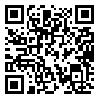1. Mistovich JJ, Hafen BQ, Karren KJ, Karren KS. Prehospital Emergency Care. 7th ed. Upper Saddle River, New Jersey, United States: Prentice Hall; 2003.
2. Dadashzadeh A, Rahmani A, Hassankhani H, Boyle M, Mohammadi E, Campbell S. Iranian pre‐hospital emergency care nurses’ strategies to manage workplace violence: A descriptive qualitative study. J Nurs Manag 2019; 27(6):1190-9. [
DOI] [
PMID]
3. Aekka A, Abraham R, Hollis M, Boudiab E, Laput G, Purohit H, et al. Prehospital trauma care education for first responders in India. J Surg Res 2015; 197(2):331-8. [
DOI] [
PMID]
4. Forslund K. Challenges in prehospital emergency care: Patient, spouse and personnel perspectives [PhD thesis]. Örebro, Sweden: Orebro University; 2007.
5. Erbay H. Some Ethical Issues in Prehospital Emergency Medicine. Turk J Emerg Med 2016; 14(4):193-8. [
DOI] [
PMID] [
PMCID]
6. Bayram JD. Emergency medicine in Lebanon: overview and prospect. J Emerg Med 2007; 32(2):217-22. [
DOI] [
PMID]
7. Clawson JJ, Sinclair R. The emotional content and cooperations score in emergency medical dispatching. Prehosp Emerg Care 2001; 5(1):29-35. [
DOI] [
PMID]
8. Chien CY, Chien WC, Tsai LH, Tsai SL, Chen CB, Seak CJ, et al. Impact of the caller’s emotional state and cooperation on out-of-hospital cardiac arrest recognition and dispatcher-assisted cardiopulmonary resuscitation. Emerg Med J 2019; 36(10):595-600. [
DOI] [
PMID]
9. Reinhardt AC. The impact of work environment on telephone advice nursing. Clin Nurs Res 2010; 19(3):289-310. [
DOI] [
PMID]
10. Ek B, Edström P, Toutin A, Svedlund M. Reliability of a Swedish pre-hospital dispatch system in prioritizing patients. Int Emerg Nurs 2013; 21(2):143-9. [
DOI] [
PMID]
11. Ecker H, Lindacher F, Dressen J, Wingen S, Hamacher S, Böttiger BW, et al. Accuracy of automatic geolocalization of smartphone location during emergency calls - A pilot study. Resuscitation 2020; 146:5-12. [
DOI] [
PMID]
12. Latter R. Predicting burnout among emergency dispatchers: The role of coping strategies, vicarious trauma, and psychological distress. Diss Abstr Int 2004; 64(9-B):4663.
13. Bedini S, Braun F, Weibel L, Aussedat M, Pereira B, Dutheil F. Stress and salivary cortisol in emergency medical dispatchers: A randomized shifts control trial. PloS One 2017; 12(5):e0177094. [
DOI] [
PMID] [
PMCID]
14. Chegini Z, Janati A, Asghari-Jafarabadi M, Khosravizadeh O. Organizational commitment, job satisfaction, organizational justice and self-efficacy among nurses. Nursing Practice Today 2019; 6(2):86-93. [
DOI]
15. Sajadi Hezaveh M, Rafii F, Khosravi S, Seyedfatemi N. The experience of stress among new clinical nurses. Nursing Practice Today 2014; 1(4):199-206. [
Article]
16. Forslund K, Kihlgren A, Kihlgren M. Operators' experiences of emergency calls. J Telemed Telecare 2004; 10(5):290-7. [
DOI] [
PMID]
17. Bahadori M, Ravangard R, Raadabadi M, Hosseini-Shokouh SM, Behzadnia MJ. Job Stress and Job Burnout Based on Personality Traits among Emergency Medical Technicians. Trauma Mon 2019; 24(6):24-31. [
DOI]
18. Ghorbanian A, Bahadori M, Nejati M. The relationship between managers' leadership styles and emergency medical technicians' job satisfaction. Australas Med J 2012; 5(1):1-7. [
DOI] [
PMID] [
PMCID]
19. Hosseinabadi R, Karampourian A, Beiranvand S, Pournia Y. The effect of quality circles on job satisfaction and quality of work-life of staff in emergency medical services. Int Emerg Nurs 2013; 21(4):264-70. [
DOI] [
PMID]
20. Rahati A, Sotudeh-Arani H, Adib-Hajbaghery M, Rostami M. Job Involvement and Organizational Commitment of Employees of Prehospital Emergency Medical System. Nurs Midwifery Stud 2015; 4(4):e30646. [
DOI] [
PMID] [
PMCID]
21. Chenari M. Hermeneutics and theory of mind. Phenomenol Cogn Sci 2009; 8(1):17-31. [
DOI]
22. Edie JM. Edmund Husserl's Phenomenology: A Critical Commentary. 1st ed. Bloomington, Indiana, United States: Indiana University Press; 1987.
23. Colaizzi PF. Reflection and research in psychology; A phenomenological study of learning. 1st ed. Dubuque, Iowa, United States: Kendall Hunt Publishing Company; 1973.
24. Colaizzi PF. Psychological research as the phenomenologist views it. In: Valle RS, King M, editors. Existencial-Phenomenological Alternatives for Psychology. 1st ed. New York, United States: Oxford University Press; 1978.
25. Guba EG, Lincoln YS. Competing paradigms in qualitative research. In: Denzin NK, Lincoln YS, editors. Handbook of qualitative research. 1st ed. Thousand Oaks, California, United States: SAGE Publishing; 1994.
26. Ek B, Svedlund M. Registered nurses' experiences of their decision‐making at an Emergency Medical Dispatch Centre. J Clin Nurs 2015; 24(7-8):1122-31. [
DOI] [
PMID]
27. Sopory P, Day AM, Novak JM, Eckert K, Wilkins L, Padgett DR, et al. Communicating Uncertainty during Public Health Emergency Events: A Systematic Review. Review of Communication Research 2019; 7:67-108. [
DOI]
28. Fischhoff B. Good decision making requires good communication. Drug Saf 2012; 35(11):983-93. [
DOI] [
PMID]
29. Cihangir-Cankaya Z. Reconsideration of the Listening Skill Scale: Comparison of the Listening Skills of the Students of Psychological Counseling and Guidance in accordance with Various Variables. Educational Sciences: Theory and Practice 2012; 12(4):2370-6. [
Google Scholar]
30. Wood JT. Interpersonal Communication: Everyday Encounters. 8th ed. Boston, Massachusetts, United States: Cengage Learning; 2015.
31. Brown T, Yu M-l, Etherington J. Are Listening and Interpersonal Communication Skills Predictive of Professionalism in Undergraduate Occupational Therapy Students? Health Professions Education 2020; 6(2):187-200. [
DOI]
32. Golding SE, Horsfield C, Davies A, Egan B, Jones M, Raleigh M, et al. Exploring the psychological health of emergency dispatch centre operatives: a systematic review and narrative synthesis. PeerJ 2017; 5:e3735. [
DOI] [
PMID] [
PMCID]
33. Davey A, Sharma P, Davey S, Shukla A. Is work-associated stress converted into psychological distress among the staff nurses: A hospital-based study. J Family Med Prim Care 2019; 8(2):511-6. [
DOI] [
PMID] [
PMCID]
34. Bolster D, Manias E. Person-centred interactions between nurses and patients during medication activities in an acute hospital setting: qualitative observation and interview study. Int J Nurs Stud 2010; 47(2):154-65. [
DOI] [
PMID]
35. Cioffi J. Heuristics, servants to intuition, in clinical decision‐making. J Adv Nurs 1997; 26(1):203-8. [
DOI] [
PMID]










